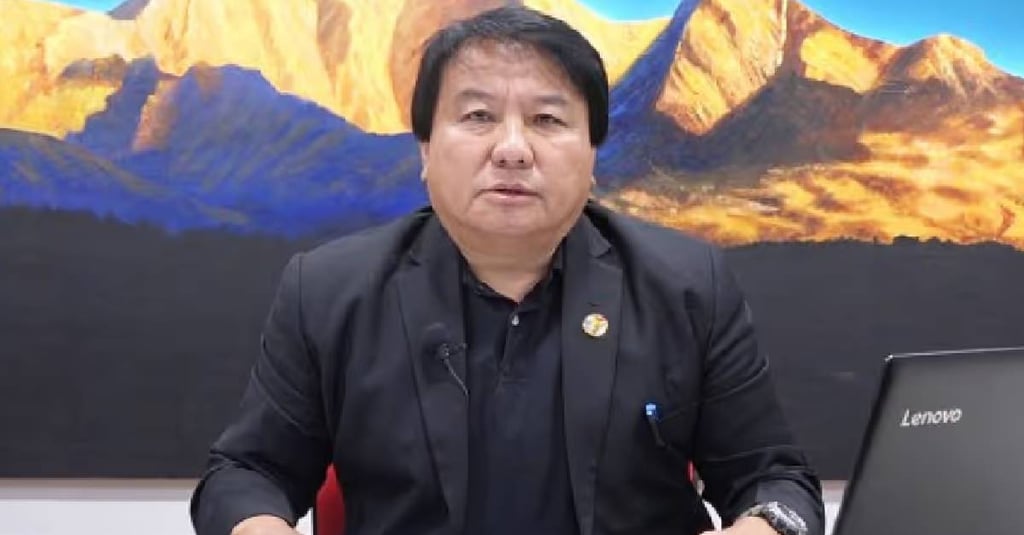M.K. Subba criticizes government’s stake sale to Greenko, says 'Teesta-III deal betrays Sikkim’s future'
“The judiciary has, in the past, annulled government decisions for failing to follow due process in disinvestment and resource allocation. This case merits the same level of scrutiny,” he said.
LOCAL


Former Member of Parliament and senior Sikkim Democratic Front (SDF) leader M.K. Subba has come forward with serious allegations regarding the disinvestment of the Government of Sikkim’s 60.08% equity stake in Sikkim Urja Limited (SUL), which operates the 1200 MW Teesta-III Hydro Electric Project (HEP) at Chungthang in North Sikkim.
The matter came to light after the High Court of Sikkim, in its judgment dated May 15, 2025, dismissed Writ Petition (PIL) No. 01 of 2024 filed by Subba challenging the Cabinet decision dated February 3, 2024, which approved the disinvestment to M/s Greenko Enterprises Pvt. Ltd. The judgment noted alleged political motivations behind the PIL, citing its filing just ahead of the 2024 Legislative Assembly elections and Subba's affiliation with the SDF.
However, Subba has termed the court's dismissal “deeply unfortunate” and asserted that the PIL was filed in bona fide public interest. “The court failed to appreciate the gravity of the matter. None of the factual and legal contentions raised by me were adequately addressed,” he said in a detailed statement.
The Teesta-III project was rendered inoperative after the catastrophic flash floods caused by the South Lhonak Lake outburst on the night of October 3–4, 2023, which destroyed the dam infrastructure. In the aftermath, a high-level meeting was held on December 6, 2023, between the Hon’ble Chief Minister of Sikkim and the Union Minister of Power and New and Renewable Energy (NRE). The meeting aimed to chart a revival roadmap for the project.
According to official communications dated December 26, 2023, several non-disinvestment-based revival measures were proposed. These included lodging insurance claims with IFFCO Tokio, pursuing Rs. 3,500 crore in receivables from Haryana and Punjab, seeking a two-year debt servicing moratorium from the Ministry of Finance, conducting due diligence on pending contractor liabilities, and revamping SUL’s management.
Subba alleged that the Cabinet, in its February 3, 2024 decision, willfully suppressed the details of this meeting and its proposed course of action, opting instead for a disinvestment route without exhausting feasible alternatives.
The core contention in Subba’s PIL revolves around the alleged procedural and legal lapses in the disinvestment decision. He claimed that the sale of the majority stake was carried out without conducting a public offer, competitive bidding, or valuation by empanelled valuers—requirements that are mandated under the Companies Act, 2013 and the Articles of Association of SUL.
SUL is registered under the Companies Act, 2013 with its corporate office in Delhi, and thus bound by statutory regulations applicable to companies nationwide. Subba said that the Government of Sikkim could not bypass these legal obligations by invoking its sovereign status.
“No public offer was made, no other shareholders were approached, and no fair market valuation was conducted by empanelled valuers. These are gross violations of transparency and fiduciary duty in the management of public assets,” Subba said.
Further, Subba highlighted discrepancies in the government's affidavit filed in court. Although it claimed compliance with Articles 168 and 169 of SUL’s Articles of Association, no documentary evidence was produced to substantiate this. Article 168 specifically requires a public offering for such a transaction, which he contends was never initiated.
The PIL also argued that the Cabinet decision contradicts the Hydro Power Policy of Sikkim and the original Implementation Agreement signed on July 18, 2005. According to the agreement, the Government of Sikkim was to hold a minimum 26% equity in SUL and retain ownership of the project after 35 years from commercial operation. Contrary to this, the February 2024 Cabinet decision reportedly extends the ownership term to 50 years in favor of Greenko Enterprises, while also reducing the agreed royalty rates from 12–15% to a staggered scale starting at just 6%.
“This decision erodes the long-term revenue and strategic control of Sikkim over one of its most valuable hydro assets,” Subba said.
Supporting the economic merit of retaining state control over SUL, Subba pointed to the State Finance Audit Report for FY 2022–23 by the Comptroller and Auditor General (CAG) of India. The report showed that SUL generated ₹1,270.19 crore in profit during the year—over 91% of the total profit of all state public sector enterprises (SPSEs) in Sikkim.
“These figures clearly demonstrate that SUL is a robust and viable entity. Why sell off such a critical asset at a time when it has proven to be the backbone of our state’s public sector profitability?” Subba questioned.
In his petition, Subba cited landmark Supreme Court judgments, including the 2G spectrum case (Centre for Public Interest Litigation v. Union of India, 2012) and the HPCL-BPCL disinvestment case (CPIL v. Union of India, 2003), to argue for greater scrutiny of executive decisions involving public resources. In both cases, the apex court underscored the importance of transparency, competitive processes, and public accountability.
“The judiciary has, in the past, annulled government decisions for failing to follow due process in disinvestment and resource allocation. This case merits the same level of scrutiny,” he said.
Despite these arguments, the Hon’ble High Court dismissed the PIL, asserting that the petition was politically motivated and timed to influence the electoral process. It also referenced Subba’s earlier PIL on the October 2023 disaster, which was dismissed for delay in filing. Subba, however, clarified that the said matter is now under the consideration of the Hon’ble Supreme Court, which has issued a notice to the Government of Sikkim.
“The dismissal was based on assumptions about my motives rather than the merit of the arguments raised,” Subba said.
